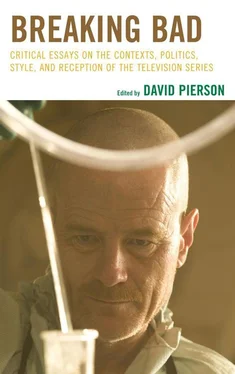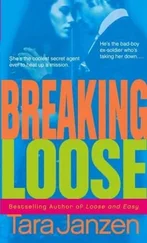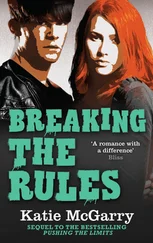Directly below drug cartels and large-scale operators, like Gus Fring, are the smaller drug entrepreneurs and dealers. In Albuquerque, the criminal drug market is dominated by undereducated, poor Latino Americans and white males who are lured by the quick cash and flashy lifestyle over low-wage employment. The white males usually serve a supporting role to the drug operations and/or act as consumers. Both of these groups are socially marginalized by a mainstream neoliberal global economy that only offers them low-wage jobs with little opportunities for social advancement. The American Southwest, with its sparsely populated rural areas, lack of social services, unproductive farming, weakened labor unions, and close proximity to the Mexican border, is one of the prime regions for the production and distribution of meth (Pine 2007). Latino American males are distinguished by an extreme form of “machismo,” which includes toughness, aggressiveness, sexism, and risk-taking behavior (Saez, et al. 2009). The impoverished whites emulate the mannerisms, language, and fashion associated with African American hip hop culture. The media dominated culture that surrounds these young men is filled with images of aggressive drug lords and vicious gangsters, [2] I’m referring to the popularity of gangsta rap, a subgenre of hip hop music, that focuses on urban crime and the violent lifestyle of inner-city youth and criminals, as well as the violent video games, such as the Grand Theft Auto series.
which affects and reflects their self-images and social behaviors. Because of these influences, the criminal drug culture in Breaking Bad is coded as hyper-masculine with an emphasis on power, dominance, and aggression.
Methamphetamine or meth has been called a neoliberal drug because it provides low-wage workers with more energy to work longer hours. It enables them to work fourteen-hour days and stay awake for as long as three weeks. Jason Pine (2007) asserts that the illegal meth is part of a much wider range of “performance enhancers” that have become both the fuel and the product of the neoliberal fetish of productivity and achievement within “the market.” These chemical boosters include everything from Starbucks double espressos to highly-caffeinated, energy drinks, steroids to Viagra, Xanax, and Adderall. Within this expanding legal narco-capitalism, workplace and everyday pharmacological doping have become normalized, expected, and in the case of students required to take attention deficit disorder medication, even mandatory. And, while increased legal restrictions on the sale of cold medication has made the rural production of meth more difficult, Wall Street brokers and college students are still able to obtain Adderall with few complications (Pine).
“I am awake,” declares Walt to Jesse, following his decision to begin cooking meth. Walt’s new vocation provides him with the excitement and renewed desire that has been missing from his stultifying middle-class existence. [3] Jodi Dean says that, in the 1997 film The Game , the main character is a bored, successfully, but emotionally detached investment banker who only finds excitement and renewed desire through “the game” that is “an unpredictable, high-risk game in which the players don’t know the rules, the other players, the conditions, the limits, or even what determines a win or a loss.” She asserts that the game represents the brutalities of the neoliberal market and thereby, opens the players up to “the possibilities of desire that their successes had foreclosed” (Dean 58). In a similar manner, I argue that the criminal meth market allows Walt to rekindle his desires to succeed. These desires have laid dormant since Walt gave up the opportunity of pursuing a profitable career in research.
Walt’s terminal condition and criminal entrepreneurship, liberate him from his former staid existence and frees him to express his repressed aggression. At the car wash, Walt explodes when his boss asks him to wipe down cars again. Walt assaults the display racks. In another scene, when Walt and his wife Skyler take Walter Jr. (R.J. Mitte) to buy pants, some young guy makes fun of Junior in front of his friends. Walt responds by knocking the guy to the ground. The old Walt would have walked out without saying anything and burned with internal rage. At the end of his first day as a meth cook, Walt is both physically and emotionally shaken, but also invigorated. Back at home, he meets his wife’s troubled inquiries with atypical sexual aggression. For Walt, neoliberal entrepreneurism restores his sense of normative masculinity and provides him with new-found confidence. Over time, as Walt finds himself becoming a full-fledged criminal, his cancer eventually goes into remission and his doctor is impressed with his recovery.
Neo-liberalism’s economic-rational individualism is conflated with aggressive, hyper-masculine behavior in the series. [4] I am not arguing that neo-liberalism has specific gendered qualities, but rather that its focus on aggressive individualism and distrust of the social are traits normally associated with western masculinity. The institutional shift the welfare state to the neoliberal state can also be understood in gendered terms. Wacquant, in Punishing the Poor , states that, through the retrenchment of the charitable welfare state combined with strict penal laws and unparalleled growth in incarceration, the government’s helping hand has been replaced with the iron fist. He asserts that, through neoliberal policies and directives, the government is undergoing a process of re-masculination away from the paternalism associated with postwar liberalism.
Neo-liberalism, with its prime concentration on promoting aggressive individualism and self-interest, does not leave much space for non-aggressive emotions, like compassion and humility, nor for socially-directed actions such as charity, working for social and economic justice, and community-building. Neo-liberalism’s focus on the primacy of self-care and entrepreneurship make it easier to attain support for cutting social services and public programs that do not directly support or promote the self-interests of the economic-rational individual.
The Drug Enforcement Agency (DEA) agents are also characterized by their aggressive and hyper-masculine behavior. With their male-bonding and masculine bravado, the DEA agents are social counterparts to the drug kingpins and dealers they are investigating. Similar to Eric Beck’s description of the social structures of The Wire , both groups are circumscribed within the bounds of neoliberal capitalism (Beck). While the drug dealers are filling a demand within an illegitimate market, the agents are busy protecting the legitimate market economy and society. The DEA agents’ aggressive behavior is best epitomized by Walt’s gregarious brother-in-law, DEA Supervisor Agent Hank Schrader. At Walt’s birthday party, Hank repeatedly berates Walt’s masculinity. In the episode “Grilled” (3/15/09), Hank boasts about a drug raid explicitly tying his sexual virility to his actions. During an intervention orchestrated by Skyler to persuade Walt to undergo treatment for his cancer, Hank is only able to relate to Walt’s situation through lame sports metaphors about winning and losing.
Beneath Hank’s tough, immodest exterior lies a deep undercurrent of emotional vulnerability. When Hank goes on a DEA stakeout in Mexico, he spots a tortoise with Tortuga’s, a drug informant, severed head attached to it. The words “HOLA DEA” are painted on the shell. To his colleagues’ amusement, Hank edges away in disgust. Seconds later, the tortoise explodes killing several of the DEA El Paso agents. Hank’s near-death experience shakes him to the core. Later, when Hank is asked to work again with the El Paso Office as part of a promotion, he begins having anxiety attacks. He makes excuses to his boss about not leaving claiming that he is pursuing new leads on a big drug case. Hank’s boss decides to give the promotion to Hank’s partner Gomez (Steven Quezada). Marie, Hank’s wife, begs him to share his feelings about Gomez taking the promotion Hank was offered. Marie tells him that after his near-death experience, it is no wonder he does not want to return to El Paso. Refusing to acknowledge any concern about Mexico, Hank exclaims that he is staying in Albuquerque is to pursue critical leads in the Heisenberg [5] The “Heisenberg” reference in Breaking Bad may refer to Werner Karl Heisenberg, a German theoretical physicist who made a foundational contribution to the founding of quantum mechanics and is best known for the uncertainty principle of quantum theory. In layman’s terms, the uncertainty principle asserts that the more precisely one property is measured, the less precisely another property will be to control, limit, and measure. In phenomenological terms, it means that human perception is always limited and incomplete. Walt’s choice of alias may serve as a reminder of the mutable and unknowable qualities of his character and actions. As with reality itself, the audience’s understanding of Walt’s character and motivations are limiting and restrictive by human perception.
(Walt’s strange drug alias) investigation.
Читать дальше












